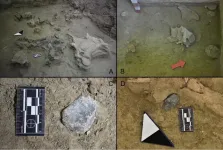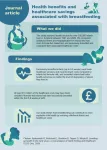(Press-News.org) One of the thorniest decisions facing older adults is when to give up their keys and stop driving. A new study by researchers at Washington University School of Medicine in St. Louis could provide guidance in helping seniors plan ahead. The researchers found that impaired cognitive function foreshadows the decision for many seniors to stop driving — more so than age or molecular signs of Alzheimer’s disease. Even very slight cognitive changes are a sign that retirement from driving is imminent. Further, women are more likely to stop driving than men, the study showed.
The findings suggest that routine cognitive testing — in particular, the kind of screening designed to pick up the earliest, most subtle decline — could help older adults and their physicians make decisions about driving to maximize safety while preserving independence as long as possible.
“Many older drivers are aware of changes occurring as they age, including subjective cognitive decline,” said corresponding author Ganesh M. Babulal, PhD, OTD, an associate professor of neurology. “Doctors should discuss such changes with their older patients. If risk is identified early, there is more time to support the remaining capacity and skills, extending the time they can drive safely, and to plan for a transition to alternative transportation options to maintain their independence when the time comes to stop driving.”
The study is published May 22 online in Neurology, the medical journal of the American Academy of Neurology.
Adults over age 65 are the most careful drivers on the road. They are less likely than drivers in any other age group to speed or to drive in bad weather, at night or under the influence of substances. Despite these precautions, age-related changes such as slower reaction time, impaired vision and cognitive decline still put older drivers at risk of crashes, and when such crashes happen, older drivers are more likely to be killed or seriously injured than younger drivers are. At the same time, giving up driving is not without its own risks. People who stop driving are more likely to develop depression and become isolated.
The American Academy of Neurology concluded in 2010 that cognitive impairment, as measured by a score greater than zero on the Clinical Dementia Rating (CDR) scale, was the best predictor of stopping driving. The CDR scale goes from zero, indicating normal cognitive function, to three, indicating severe dementia. But the CDR, which was developed at Washington University in 1982, is designed to detect impairments significant enough to affect daily life. Studies have shown that a person’s cognitive skills can deteriorate for years before a CDR score indicates trouble.
Babulal and colleagues set out to determine the role of other factors, including subtle cognitive changes, in the decision to step away from the wheel. They studied 283 people with an average age of 72 who drove at least once a week and who had no cognitive impairments at the start of the study. The researchers were primarily interested in determining when and why each participant stopped driving.
The participants underwent cognitive tests at the start and then every year for an average of 5.6 years. The cognitive testing included the CDR and a preclinical Alzheimer’s cognitive composite (PACC) score, which is designed to detect subtle cognitive changes in people who score as unimpaired on the CDR. The participants also underwent brain scans and donated cerebrospinal fluid at the start of the study and then every two to three years, so the researchers could look for molecular signs of Alzheimer’s disease. At baseline, about one-third of the people met the criteria for preclinical Alzheimer’s disease based on levels of biomarkers for the disease — amyloid plaques and tau tangles — in the brain and cerebrospinal fluid.
During the study, 24 people stopped driving, 15 people died, and 46 people developed cognitive impairment as measured by a CDR score greater than zero.
Analysis showed that three factors predicted who would stop driving during the study: cognitive impairment, worsening PACC scores, and being a woman. People who met the criteria for cognitive impairment by scoring 0.5 or greater on the CDR were 3.5 times more likely to stop driving than were those who remained at zero, and people with lower scores on the PACC were 30% more likely to stop driving than were those with higher scores. Age and the presence of biomarkers of Alzheimer’s disease were not tied to the decision to stop driving.
The biggest effect was seen regarding gender, with women four times more likely to stop driving during the course of the study than men were.
“We know from past studies that there isn’t a difference in driving ability between men and women,” Babulal said. “What we have shown in prior work is that women are often more aware of their abilities, are more willing to admit that they are no longer able to safely drive, and plan more in advance to transition out of driving compared to their male counterparts. It is highly recommended that older male drivers talk with their providers about driving and consider stopping driving earlier.”
Doctors do not routinely counsel older patients on driving cessation, a fact that Babulal sees as a missed opportunity to promote healthy aging.
“There are things we can do to help people adapt to age-related changes,” Babulal said. “Driver rehabilitation programs, often led by occupational therapists, can provide specialized training and strategies for older drivers to adjust to physical and cognitive changes to maintain driving capacity. Community support programs provide a forum for older adults to share experiences and learn from each other about safe driving practices and alternative transportation options. Ultimately, most people will need to stop driving, but by starting the conversation early, we can better support older adults’ independence and quality of life.”
END
Subtle cognitive decline precedes end to driving for older adults
Routine cognitive testing may help older drivers plan for life after driving
2024-05-22
ELSE PRESS RELEASES FROM THIS DATE:
Irina Petrache, MD, ATSF, commences term as President of the American Thoracic Society
2024-05-22
May 22, 2024 – Irina Petrache, MD, ATSF, today added president of the American Thoracic Society to her list of accomplishments. The announcement came on the heels of the Plenary Session at the ATS 2024 International Conference. The slate of officers to serve on the Society’s Executive Committee for the 2024-2025 term consists of the following:
Irina Petrache, MD, ATSF, Incoming President
Dr. Petrache is professor of medicine at National Jewish Health and at the University of Colorado. She also serves as chief of Pulmonary, Critical Care and Sleep Medicine, associate ...
Beach erosion will make Southern California coastal living five times more expensive by 2050, USC study predicts
2024-05-22
Contact: Nina Raffio, raffio@usc.edu or (213) 442-8464
Rising sea levels and urban development are accelerating coastal erosion at an alarming rate in Southern California with significant ripple effects on the region’s economy, a USC study reveals.
The study, published in Communications Earth & Environment, predicts that Southern California’s coastal living costs will surge fivefold by 2050 as a direct result of beach erosion. This erosion will require more frequent and costly beach nourishment projects to maintain the state’s treasured shorelines, consequently driving up the cost of living along the coast.
“Our ...
Mount Sinai experts to present new research on long COVID, lung cancer, asthma, sleep apnea, and more at ATS 2024 International Conference
2024-05-22
World renowned pulmonologists and experts in respiratory medicine from the Mount Sinai Health System in New York City will present new research at the American Thoracic Society (ATS) 2024 International Conference in San Diego from May 17–May 22. Please let me know if you would like to coordinate an interview about their work. Mount Sinai doctors and researchers are also available to comment on breaking news and trending topics.
Sessions and Symposiums
(All abstracts listed below are under embargo until the scheduled start ...
Ancient people hunted extinct elephants at Tagua Tagua Lake in Chile 12,000 years ago
2024-05-22
Thousands of years ago, early hunter-gatherers returned regularly to Tagua Tagua Lake in Chile to hunt ancient elephants and take advantage of other local resources, according to a study published May 22, 2024 in the open-access journal PLOS ONE by Rafael Labarca of the Pontifical Catholic University of Chile and colleagues.
Multiple archaeological sites are known from the region of Tagua Tagua Lake in central Chile, representing some of the earliest known human settlements in the Americas. In this study, Labarca and colleagues report ...
Twitter may be overlooking misinformation "superspreaders" - political pundits, low-credibility media outlets, and influencers who use more toxic language than the typical misinformation spreader
2024-05-22
Twitter may be overlooking misinformation "superspreaders" - political pundits, low-credibility media outlets, and influencers who use more toxic language than the typical misinformation spreader
###
Article URL: https://journals.plos.org/plosone/article?id=10.1371/journal.pone.0302201
Article Title: Identifying and characterizing superspreaders of low-credibility content on Twitter
Author Countries: USA, UK
Funding: This work was supported by the John S. and James L. Knight Foundation, Craig Newmark Philanthropies, and the National Science Foundation (grant ACI-1548562). The funders had no role in study design, data ...
Escaped GMO canola plants persist long-term, but may be losing their extra genes
2024-05-22
Populations of canola plants genetically engineered to be resistant to herbicides can survive outside of farms, but may be gradually losing their engineered genes, reports a new study led by Cynthia Sagers of Arizona State University, US, published May 22 in the open-access journal PLOS ONE.
The hypothesis has been put forward that if any genetically engineered crop plants escape farm fields, they will be short-lived. This would make them unlikely to take over wild areas or spread their inserted genes, called transgenes, to wild populations ...
Ancient Mycenaean armor tested by Marines and pronounced suitable for extended combat
2024-05-22
A famous Mycenaean suit of armor was not just ceremonial, but suitable for extended combat, according to a study published May 22, 2024 in the open-access journal PLOS ONE by Andreas Flouris of the University of Thessaly, Greece and colleagues.
One of the oldest known suits of European armor is a 3500-year-old suit found near the village of Dendra, a few kilometers away from ancient Mycenae. Since its discovery in 1960, it has been unclear if this was a ceremonial suit or if it was suitable for battle. This question has important implications for understanding ...
Health and economic benefits of breastfeeding quantified
2024-05-22
Breastmilk can promote equitable child health and save healthcare costs by reducing childhood illnesses and healthcare utilization in the early years, according to a new study published this week in the open-access journal PLOS ONE by Tomi Ajetunmobi of the Glasgow Centre for Population Health, Scotland, and colleagues.
Breastfeeding has previously been found to promote development and prevent disease among infants. In Scotland – as well as other developed countries – low rates of breastfeeding in more economically deprived areas are thought to contribute to inequalities in early childhood health. However, government policies ...
San Francisco study explores the growing culture of fentanyl smoking
2024-05-22
An interview-based study in San Francisco, CA, highlights individual experiences and local trends around fentanyl smoking, deepening understanding of this growing practice. Daniel Ciccarone of the University of California, San Francisco, and colleagues present their findings in the open-access journal PLOS ONE on May 22, 2024.
Use of illicitly manufactured fentanyl is associated with high risk of addiction, health issues, and exceptionally high overdose risk. Fentanyl significantly contributes to the escalating rate of drug ...
MIT scientists learn how to control muscles with light
2024-05-22
CAMBRIDGE, MA – For people with paralysis or amputation, neuroprosthetic systems that artificially stimulate muscle contraction with electrical current can help them regain limb function. However, despite many years of research, this type of prosthesis is not widely used because it leads to rapid muscle fatigue and poor control.
MIT researchers have developed a new approach that they hope could someday offer better muscle control with less fatigue. Instead of using electricity to stimulate muscles, they used ...
LAST 30 PRESS RELEASES:
Scientists deliver new molecule for getting DNA into cells
Study reveals insights about brain regions linked to OCD, informing potential treatments
Does ocean saltiness influence El Niño?
2026 Young Investigators: ONR celebrates new talent tackling warfighter challenges
Genetics help explain who gets the ‘telltale tingle’ from music, art and literature
Many Americans misunderstand medical aid in dying laws
Researchers publish landmark infectious disease study in ‘Science’
New NSF award supports innovative role-playing game approach to strengthening research security in academia
Kumar named to ACMA Emerging Leaders Program for 2026
AI language models could transform aquatic environmental risk assessment
New isotope tools reveal hidden pathways reshaping the global nitrogen cycle
Study reveals how antibiotic structure controls removal from water using biochar
Why chronic pain lasts longer in women: Immune cells offer clues
Toxic exposure creates epigenetic disease risk over 20 generations
More time spent on social media linked to steroid use intentions among boys and men
New study suggests a “kick it while it’s down” approach to cancer treatment could improve cure rates
Milken Institute, Ann Theodore Foundation launch new grant to support clinical trial for potential sarcoidosis treatment
New strategies boost effectiveness of CAR-NK therapy against cancer
Study: Adolescent cannabis use linked to doubling risk of psychotic and bipolar disorders
Invisible harms: drug-related deaths spike after hurricanes and tropical storms
Adolescent cannabis use and risk of psychotic, bipolar, depressive, and anxiety disorders
Anxiety, depression, and care barriers in adults with intellectual and developmental disabilities
Study: Anxiety, gloom often accompany intellectual deficits
Massage Therapy Foundation awards $300,000 research grant to the University of Denver
Gastrointestinal toxicity linked to targeted cancer therapies in the United States
Countdown to the Bial Award in Biomedicine 2025
Blood marker from dementia research could help track aging across the animal world
Birds change altitude to survive epic journeys across deserts and seas
Here's why you need a backup for the map on your phone
ACS Central Science | Researchers from Insilico Medicine and Lilly publish foundational vision for fully autonomous “Prompt-to-Drug” pharmaceutical R&D
[Press-News.org] Subtle cognitive decline precedes end to driving for older adultsRoutine cognitive testing may help older drivers plan for life after driving







